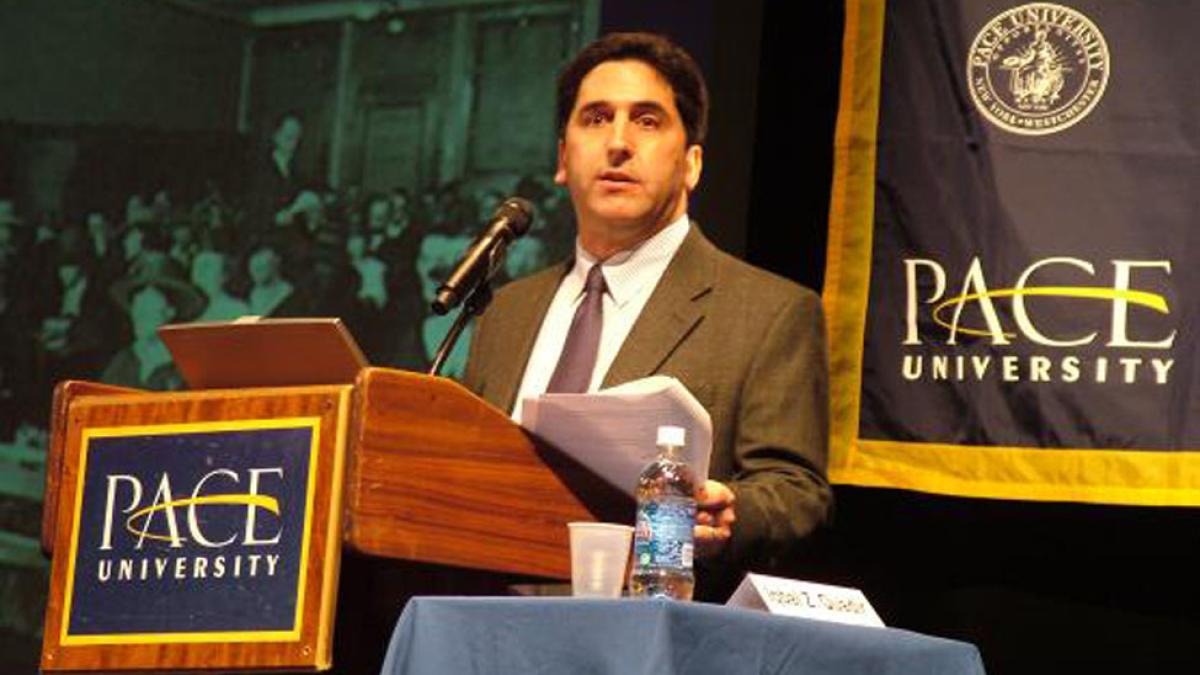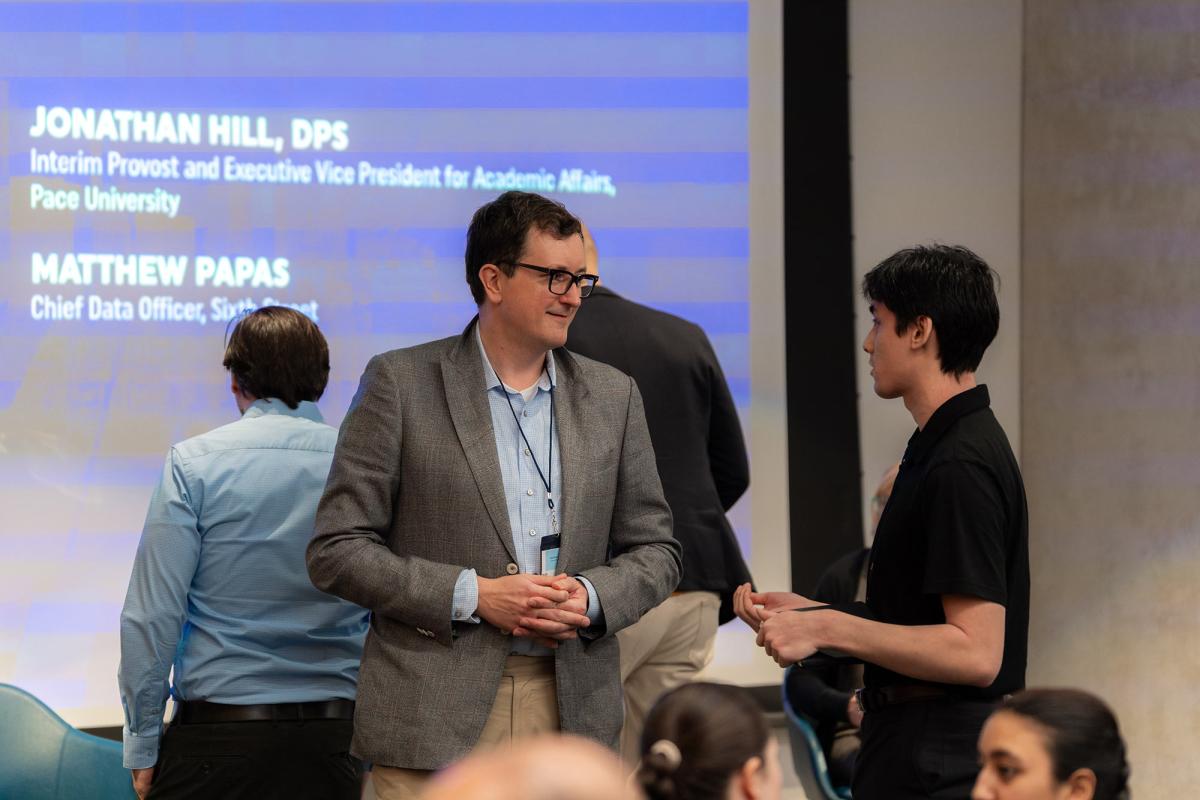
Press Release: Tech Exec to Students: Critical Thinking Essential in Era of Artificial Intelligence
A leading technology executive told Pace University students that curiosity, critical thinking, and drive are essential skills in thriving in the era of artificial intelligence and evolving technologies.
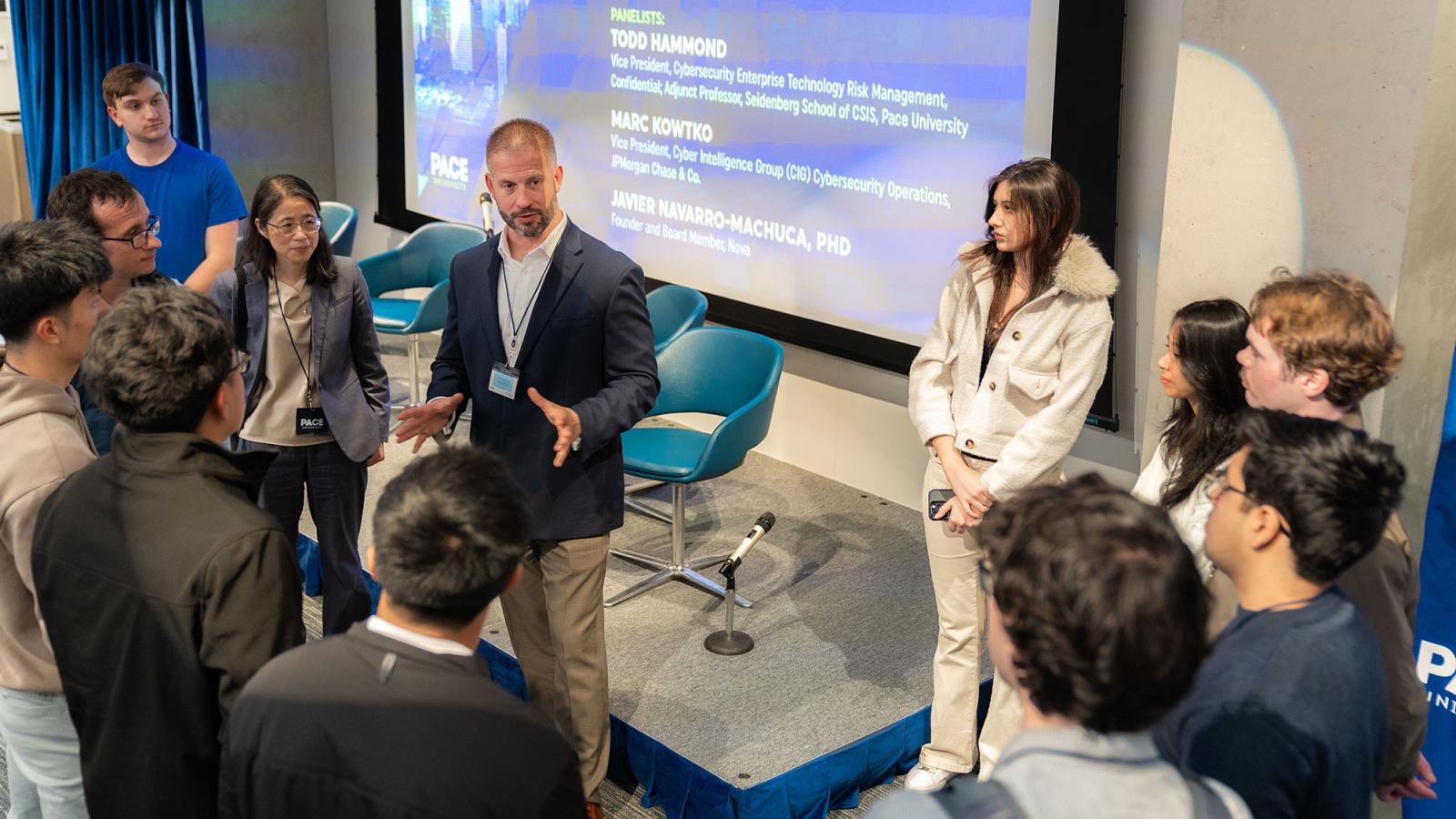
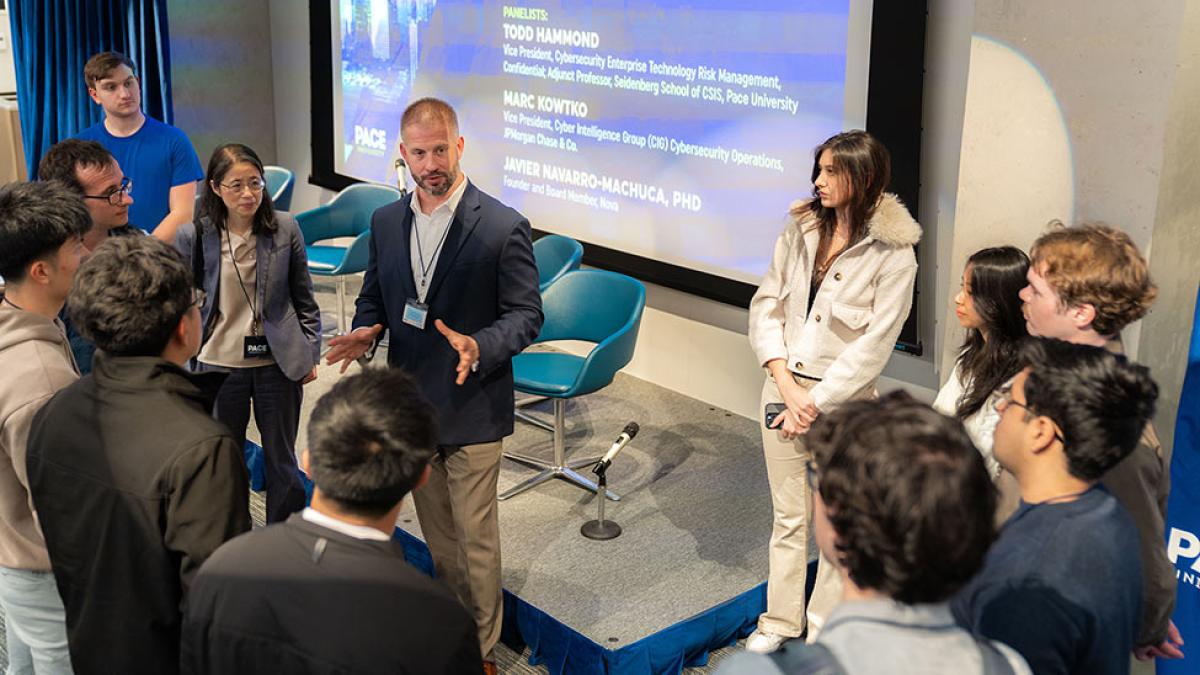
Pace University hosts its second annual fintech conference exploring AI, tokenization, cybersecurity, and the future of hiring in financial services
A leading technology executive told Pace University students that curiosity, critical thinking, and drive are essential skills in thriving in the era of artificial intelligence and evolving technologies.
In speaking before hundreds of students, faculty, alumni, and industry professionals at Pace University in Lower Manhattan for the second annual Pace of Fintech: Accelerating Innovation Conference, Matthew Papas, chief data officer at Sixth Street, gave students of all majors and interests sage advice.
“You’re never going to know everything walking in the door — the most important skill is being able to figure things out,” said Papas. “The best people I’ve hired aren’t necessarily computer science or finance majors. I’ve seen musicians and liberal arts grads thrive because they understand how data, technology, and business connect. If you’re curious and willing to experiment, you can learn almost anything. The tools are all out there — it’s about having the drive to use them.”
The event, a collaboration between Pace University and global investment firm Sixth Street, explored how artificial intelligence, tokenization, and cybersecurity are reshaping the financial services landscape and the future of work. A keynote fireside chat and expert panel sessions offered students real-world insights and a front-row seat to the forces transforming the fintech landscape.

The program opened with a thought-provoking fireside chat between Jonathan Hill, DPS, interim provost and executive vice president for academic affairs at Pace, and Papas, Sixth Street’s chief data officer. Their discussion examined the explosive growth of data in financial decision-making and set the tone for an afternoon of bold ideas and future-focused dialogue.
“This conference is a testament to the power of collaboration between academia and industry to drive innovation,” said Hill. “By bringing together experts and emerging leaders in fintech, we’re not only exploring the technologies transforming global finance—we’re preparing our students to shape that future.”
The event built on the momentum of Pace’s inaugural Actionable AI Conference in Pleasantville, further underscoring the University’s leadership at the intersection of artificial intelligence, education, and industry innovation.
Among the featured sessions were three panel discussions that explored emerging challenges and opportunities in the fintech space:
The first panel, “Tokenization and Its Implications for Financial Markets,” sponsored by the Lubin School of Business, was moderated by finance professor Iuliana Ismailescu. The session explored how blockchain, tokenization, and digital assets are reshaping traditional financial systems and accelerating the shift toward a decentralized future. Panelists included Piotr Marciszweki, commercialization lead for digital assets and Carlos Vivas, head of engineering for Citi’s Digital Assets Platform, as well as Janet Wynn, adjunct professor of finance at Lubin. Together, they addressed the regulatory, technical, and institutional challenges that come with this transformation.
Shifting from technology to talent, the next discussion, “Hiring Great Talent in the FinTech Industry,” offered students an inside look at what today’s fintech employers are really looking for. Kate Smith, HR business partner and Whitney Hannallah, investment engineering analyst — both of Sixth Street — joined Phyllis Mooney, assistant vice president of Career Services and Employer Relations at Pace, to share insights on preparing for the industry’s evolving demands. From adapting to market trends to building cross-functional skills, panelists emphasized that success in fintech depends as much on curiosity and adaptability as it does on technical knowledge.
“Even the biggest financial firms have long understood that technology isn’t just there to support the business — it’s what drives it forward,” said Smith, of Sixth Street. “That’s why curiosity and adaptability matter so much. We don’t expect you to know everything, but we want to see that you’re a sponge — that you ask questions, stay curious, and find ways to grow. That mindset is a gift, and it’s one of the most valuable traits any team looks for.”
To close out the conference, “Cybersecurity Threats to Financial Services: From Infrastructure to AI,” tackled one of the most pressing concerns facing the industry today. Led by Li-Chiou Chen, interim dean and professor at the Seidenberg School, the panel brought together cybersecurity leaders including Todd Hammond, vice president of cybersecurity enterprise technology risk management and adjunct professor at Pace, Marc Kowtko of JPMorgan Chase, and Javier Navarro-Machuca, PhD, founder and board member of Nova. The session explored how financial institutions are adapting to an increasingly complex threat landscape, from foundational infrastructure risks to the far-reaching implications of generative AI.
“AI isn’t a career ender—it’s a game changer,” said Hammond. “We’ll learn to work alongside it, master it, and use it to amplify what only humans can bring: our ethics, our morals, and our creativity.”
A networking reception followed the panels, offering students and guests the opportunity to connect with speakers, recruiters, and faculty. As part of its broader commitment to innovation and workforce readiness, Pace also announced the launch of a new Bachelor of Science in Artificial Intelligence, beginning in fall 2026. Offered through the Seidenberg School, the new program complements existing master’s degrees in Artificial Intelligence and Applied Artificial Intelligence and reflects Pace’s ongoing commitment to equipping students with practical skills and a strong understanding of how emerging technologies are transforming the world.
“Fintech is transforming the world, and at Pace University, we have been preparing our students to lead that transformation,” said Pace President Marvin Krislov. “This conference reflected what Pace does best, bringing together industry and academia to turn ideas into action. Our continued partnership with Sixth Street gave students, faculty, and professionals the chance to learn from one another, share insights, and explore the technologies that are driving the future of finance.”
About Pace University
Since 1906, Pace University has been transforming the lives of its diverse students—academically, professionally, and socioeconomically. With campuses in New York City and Westchester County, Pace offers bachelor, master, and doctoral degree programs to 13,600 students in its College of Health Professions, Dyson College of Arts and Sciences, Elisabeth Haub School of Law, Lubin School of Business, Sands College of Performing Arts, School of Education, and Seidenberg School of Computer Science and Information Systems.
About the Lubin School of Business at Pace University
Globally recognized and prestigiously accredited, the Lubin School of Business integrates New York City’s business world into the experienced-based education of its students at Pace’s suburban and downtown campuses, implemented by one of the region’s largest co-op programs, team-based learning, and customized career guidance. Its programs are designed to launch success-oriented graduates toward upwardly mobile careers.
About the Seidenberg School of Computer Science and Information Systems at Pace University
The Seidenberg School of Computer Science and Information Systems at Pace University is a leading institute of technology education. Students experience a dynamic and expansive technology education at the undergraduate and graduate levels. One of the first comprehensive schools of computing in the nation, the Seidenberg School is strategically located in the heart of NYC’s tech scene, right on the doorstep of New York’s most promising companies. With access to established tech giants and exciting new start-ups from both the New York City and the Westchester campus, Seidenberg offers the opportunity to connect, intern with, and enjoy lucrative tech jobs following graduation. Through partnerships with leading tech firms, banks, federal agencies, and global institutions, the school’s curricula and programs are designed to ground students in the fundamentals while offering numerous hands-on experiential learning opportunity. The faculty includes numerous experts in artificial intelligence, cybersecurity, data science, game development, software engineering, and much more, who operate labs and centers providing students with practical experience and connections that lead to impressive internships and jobs.
About Sixth Street
Sixth Street is a global investment firm with over $75 billion in assets under management and committed capital. Sixth Street uses its long-term flexible capital, data-enabled capabilities, and One Team culture to develop themes and offer solutions to companies across all stages of growth. Founded in 2009, Sixth Street has more than 600 team members including over 250 investment professionals operating around the world.
The Racism And Islamophobia Behind Many Of The Attacks On Zohran Mamdani
In The Guardian, Pace University Professor Laura Tamman examined the racism and Islamophobia fueling attacks against New York City mayoral candidate Zohran Mamdani, praising his “impressive composure under pressure.” Her analysis shed light on the broader social and political forces shaping the city’s high-stakes race.
What Students Study Matters. How Colleges Guide Them Matters More.
Pace President Marvin Krislov writes a piece in Forbes about the crucial role universities play in guiding students—especially first-generation college-goers—from the classroom to career success. He emphasizes that while ambition and curiosity abound, many students “lack a map,” and it’s the institution’s responsibility to help them build one through advising, mentorship, and hands-on learning.
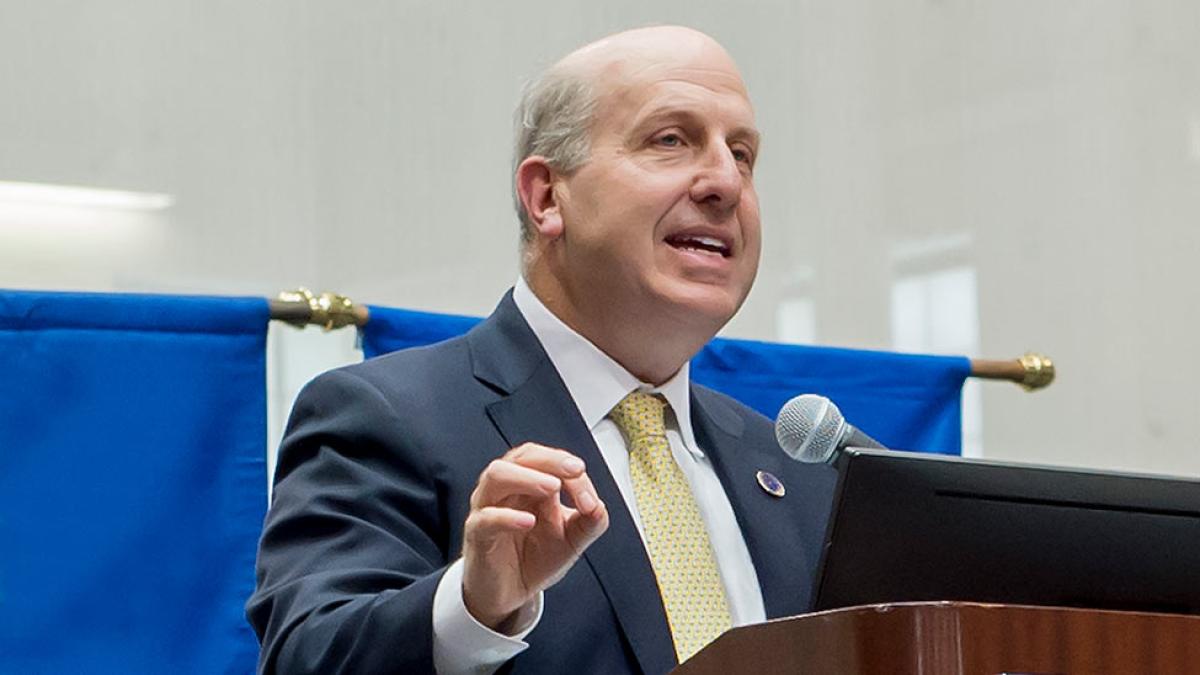
Voter Turnout Surges In NYC Mayor’s Race, With Boomers And Gen X Leading The Charge
Speaking with Gothamist, Pace University Professor Laura Tamman discussed how rising voter participation among Boomers and Gen X could significantly influence the city’s political landscape. She also reflected on the importance of civic engagement in her Vital City NYC op-ed, “A True Mandate for New York City,” examining what true political consensus means in a divided time.
Pace University to Launch Bachelor of Science in Artificial Intelligence in Fall 2026
The Business Council of Westchester highlight Pace’s new Bachelor of Science in Artificial Intelligence, launching in Fall 2026. Offered through the Seidenberg School of Computer Science and Information Systems, the program—Westchester’s first undergraduate AI degree—will train students in machine learning, data analytics, and AI ethics.
Trump Extorts DOJ for $230M While Gov’t Workers Scramble to Make Ends Meet
The Daily Show spotlighted the controversy over President Trump’s demand for Justice Department compensation—a move Pace Haub Law Professor Bennett Gershman called “bizarre” and a “profound ethical conflict” in The New York Times—turning the heated legal debate into a moment of sharp political satire.
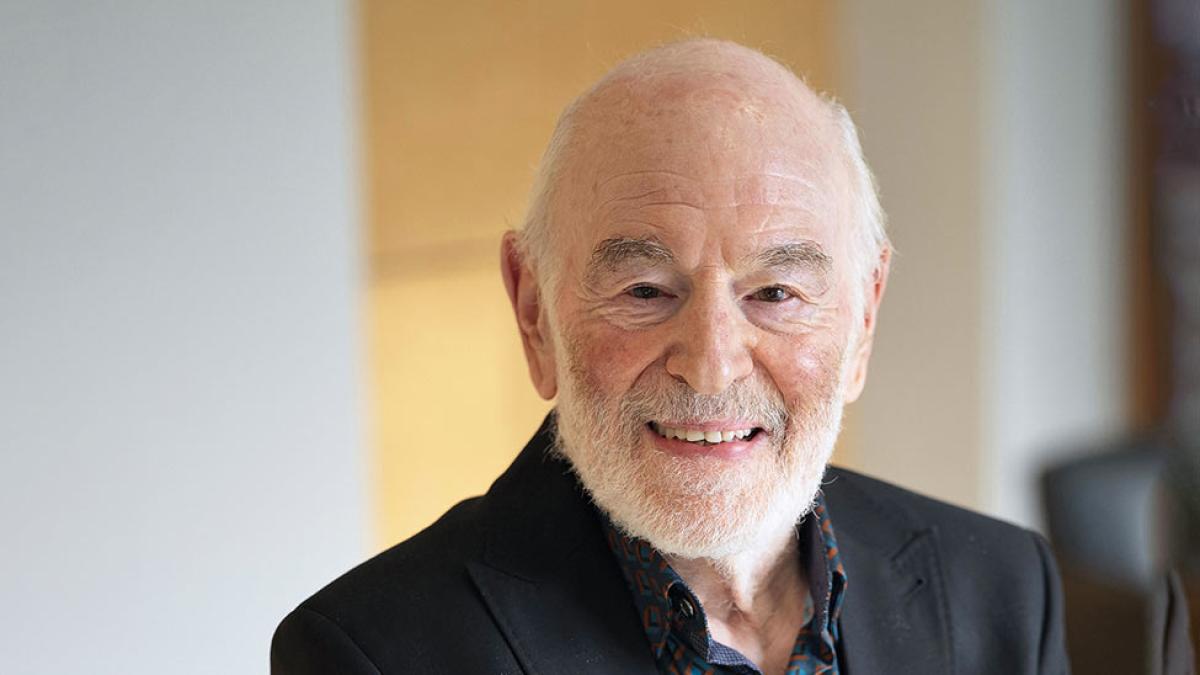
NYC Sees Massive Increase In Early Voting In Mayoral Election Compared To 2021
In ABC News, Dyson Professor Tamman analyzed early voter turnout patterns, explaining that it’s “hard to say definitively what is happening with only borough-wide numbers available” but that generational shifts could play a decisive role.
The Accounting Comeback
Lubin Professor Dale Goldstein pens an op-ed in The CPA Journal on how accounting is evolving amid automation and AI. He highlights the resurgence of student interest in the field—especially at Pace, home to one of New York City’s oldest accounting programs—and argues that technology is redefining accounting as a data-driven, globally connected profession.
Preparing for an AI Future: Pace Unveils New BS in Artificial Intelligence
Pace University is preparing students for the rise of AI with the addition of a new Bachelor of Science in Artificial Intelligence. Students will learn critical skills in machine learning, data analysis, and AI ethics. Pace is the first school in Westchester to offer an undergraduate degree in AI, and the program is now accepting applications for next fall.
Will Al Replace Your Job? Bruce Bachenheimer on Students & Entrepreneurs
In a Pace podcast, Lubin Professor Bruce Bachenheimer discussed how artificial intelligence is reshaping industries and higher education. He reflected on AI’s potential to “create new kinds of work while redefining what innovation means,” emphasizing the need for adaptability among students and entrepreneurs.
